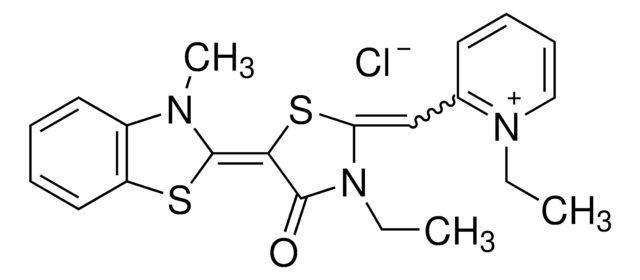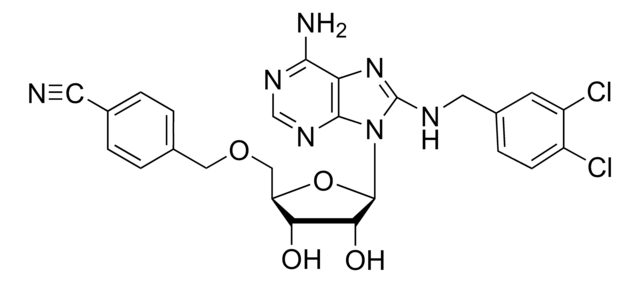5.31067
HSP70 Inhibitor, PES-Cl
Sinónimos:
HSP70 Inhibitor, PES-Cl, Heat Shock Protein 70 Inhibitor
Iniciar sesiónpara Ver la Fijación de precios por contrato y de la organización
About This Item
Fórmula empírica (notación de Hill):
C8H6ClNO2S
Peso molecular:
215.66
Productos recomendados
Ensayo
≥98% (HPLC)
Nivel de calidad
Formulario
powder
potencia
2-5 μM IC50
fabricante / nombre comercial
Calbiochem®
condiciones de almacenamiento
OK to freeze
protect from light
color
white
solubilidad
DMSO: 100 mg/mL
temp. de almacenamiento
2-8°C
Descripción general
A cell-permeable chlorophenylethynylsulfonamide compound that binds directly to the substrate-binding domain of heat shock protein 70 (HSP70) and disrupts its interaction with client proteins. Impairs the activity of the anaphase promoting complex/cyclosome (APC/C) in cell-free extracts. Arrests cell cycle at G2/M phase and preferentially induces genomic instability in cancer cells (IC50 = 2 to 5 µM in melanoma cell lines). Exhibits much reduced toxicity in non-transformed cells (IC50 >100 µM in primary melanocytes). Induces apoptosis and inhibits autophagy as evidenced by increased p62SQSTM1 and LC3 accumulation. Also, shown to extend life in murine models of pre-B cell lymphoma.
A cell-permeable chlorophenylethynylsulfonamide compound that binds directly to the substrate-binding domain of heat shock protein 70 (HSP70) and disrupts its interaction with client proteins. Impairs the activity of the anaphase promoting complex/cyclosome (APC/C) in cell-free extracts. Arrests cell cycle at G2/M phase and preferentially induces genomic instability in cancer cells (IC50 = 2 to 5 µM in melanoma cell lines). Exhibits much reduced toxicity in non-transformed cells (IC50 >100 µM in primary melanocytes). Induces apoptosis and inhibits autophagy as evidenced by increased p62SQSTM1 and LC3 accumulation. Also, shown to extend life in murine models of pre-B cell lymphoma.
Please note that the molecular weight for this compound is batch-specific due to variable water content.
Please note that the molecular weight for this compound is batch-specific due to variable water content.
Acciones bioquímicas o fisiológicas
Cell permeable: yes
Primary Target
HSP70
HSP70
Reversible: yes
Envase
Packaged under inert gas
Advertencia
Toxicity: Standard Handling (A)
Reconstitución
Following reconstitution, aliquot and freeze (-20°C). Stock solutions are stable for up to 3 months at -20°C.
Otras notas
Balaburski, G., et al. 2013. Mol. Cancer Res.11, 1.
Budina-Kolomets, A. et al. 2013. Cancer Biol. Ther.15, 194.
Budina-Kolomets, A. et al. 2013. Cancer Biol. Ther.15, 194.
Información legal
CALBIOCHEM is a registered trademark of Merck KGaA, Darmstadt, Germany
Código de clase de almacenamiento
11 - Combustible Solids
Clase de riesgo para el agua (WGK)
WGK 3
Punto de inflamabilidad (°F)
Not applicable
Punto de inflamabilidad (°C)
Not applicable
Certificados de análisis (COA)
Busque Certificados de análisis (COA) introduciendo el número de lote del producto. Los números de lote se encuentran en la etiqueta del producto después de las palabras «Lot» o «Batch»
¿Ya tiene este producto?
Encuentre la documentación para los productos que ha comprado recientemente en la Biblioteca de documentos.
Los clientes también vieron
Anna Budina-Kolomets et al.
Cancer biology & therapy, 15(2), 194-199 (2013-10-09)
The chaperone HSP70 promotes the survival of cells exposed to many different types of stresses, and is also potently anti-apoptotic. The major stress-induced form of this protein, HSP70-1, is overexpressed in a number of human cancers, yet is negligibly expressed
Gregor M Balaburski et al.
Molecular cancer research : MCR, 11(3), 219-229 (2013-01-11)
The stress-induced HSP70 is an ATP-dependent molecular chaperone that plays a key role in refolding misfolded proteins and promoting cell survival following stress. HSP70 is marginally expressed in nontransformed cells, but is greatly overexpressed in tumor cells. Silencing HSP70 is
Nuestro equipo de científicos tiene experiencia en todas las áreas de investigación: Ciencias de la vida, Ciencia de los materiales, Síntesis química, Cromatografía, Analítica y muchas otras.
Póngase en contacto con el Servicio técnico






